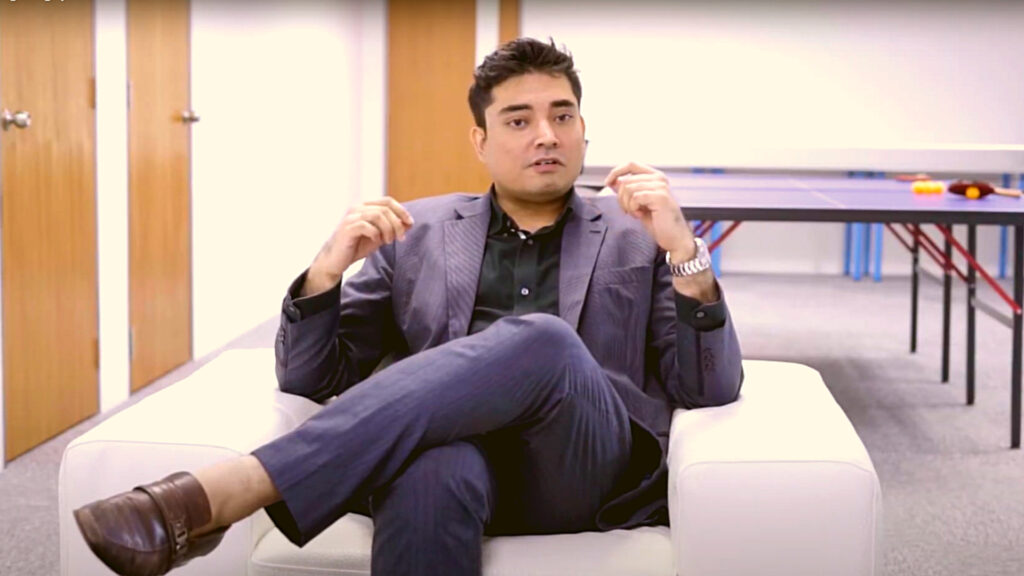In the world of memory feats and inspirational speaking, Sancy Suraj is a household name. With multiple world records and national records to his name, Suraj is a renowned memory athlete and trainer who has inspired thousands of individuals across the globe. As the CEO of Knowles Training Institute, The Umonics Method, and Pinnacle Minds, Suraj has also demonstrated his expertise in leadership and entrepreneurship. In this article, we speak with Sancy Suraj about his approach to memory, his work as an inspirational speaker, and his advice for those looking to improve their memory and speaking skills.

How did you first become interested in the art of remembering, and how did that lead you to become an inspirational speaker?
Thank you for your question. It all started when I was studying for my A-levels. I found it difficult to remember all the information I needed to know for my exams, so I started exploring techniques to help me remember more effectively. I discovered the art of memory, which is an ancient technique used by the ancient Greeks and Romans to remember vast amounts of information. I was fascinated by the power of the human brain and the potential we have to remember incredible amounts of information.
As I continued to develop my skills in memory techniques, I began participating in memory competitions and started to break records. I was able to memorize incredible amounts of information, including decks of cards and numbers, and eventually, I even broke a Guinness World Record for the longest color sequence memorized. This experience led me to start teaching others about the art of memory and how to use these techniques to improve their memory and learning abilities.
As I began teaching others, I realized the incredible impact that memory techniques can have on people’s lives. By helping individuals improve their memory and learning abilities, they are able to achieve more in their careers and personal lives. I started to see the connection between memory techniques and personal development, which led me to start combining my memory training with motivational speaking.
As an inspirational speaker, I am able to share my personal experiences and knowledge with others, inspiring them to unlock their own potential and achieve their goals. Through my talks, I emphasize the importance of hard work, discipline, and persistence, and how these qualities are essential to achieving success in any area of life. By combining memory techniques with motivational speaking, I am able to help others unlock their full potential and achieve their own personal and professional goals.
You have achieved multiple world and national records in memorization feats. How do you apply your memory skills in your role as an inspirational speaker, and how do you use them to inspire others?
As an inspirational speaker and memory trainer, I use my memory skills to demonstrate the power of the human brain and the incredible potential we have to remember vast amounts of information. I often start my talks by demonstrating some of my own memorization feats, such as memorizing a deck of cards in under two minutes or reciting the first 100 digits of pi. This helps to grab the audience’s attention and get them excited about the topic of memory and personal development.
Once I have their attention, I then use my memory techniques to teach the audience how to improve their own memory and learning abilities. I explain how to use techniques such as visualization, association, and chunking to remember information more effectively. I also emphasize the importance of repetition and practice, as well as the value of developing a disciplined and focused mindset.
In addition to teaching memory techniques, I also use my skills as an inspirational speaker to motivate and inspire the audience to achieve their own personal and professional goals. I share my personal story of how I overcame challenges and setbacks to achieve my own success, and encourage the audience to believe in themselves and their own abilities. I often use real-life examples and anecdotes to illustrate the power of hard work, persistence, and determination.
Overall, my goal as an inspirational speaker and memory trainer is to empower individuals to unlock their full potential and achieve their own personal and professional goals. By combining my memory skills with motivational speaking, I am able to provide a unique and impactful experience that inspires and motivates individuals to take action and achieve success in their own lives.
As an inspirational speaker, what is your approach to crafting your talks, and how do you ensure that your message resonates with your audience?
Crafting a talk is an art form that requires a lot of preparation and thought. As an inspirational speaker, I take a very intentional approach to crafting my talks to ensure that my message resonates with my audience. Here are some of the key steps I take:
Identify the audience: The first step in crafting a talk is to understand who the audience is and what their needs and interests are. I research the audience to understand their background, goals, and challenges, and tailor my talk to meet their specific needs.
Develop a clear message: Once I have a good understanding of the audience, I develop a clear message that will resonate with them. I focus on a single, powerful idea that is relevant and impactful for the audience.
Use stories and examples: To make my message more engaging and relatable, I use stories and examples to illustrate my points. I draw from my own experiences, as well as real-life examples, to create a powerful narrative that brings my message to life.
Incorporate interactive elements: To keep the audience engaged and involved, I often incorporate interactive elements into my talks, such as exercises or group discussions. This helps to create a more dynamic and memorable experience for the audience.
Practice and refine: Once I have developed the content for my talk, I practice it multiple times to ensure that it flows smoothly and effectively. I also seek feedback from others to refine and improve the message.
By taking this approach to crafting my talks, I am able to create a powerful and impactful experience that resonates with my audience and inspires them to take action.
“Crafting an unforgettable talk is an art that starts with understanding the audience, developing a clear message, and bringing it to life with stories, examples, and interactive elements. Through practice and refinement, we can create a powerful experience that resonates with hearts and minds, leaving a lasting impact and inspiring action.”
What do you see as the key qualities that make someone an effective inspirational speaker, and how do you cultivate those qualities in yourself?
In my opinion, there are several key qualities that make someone an effective inspirational speaker:
Authenticity: An effective inspirational speaker is authentic and genuine, with a clear passion and enthusiasm for their message. They are able to connect with the audience on a personal level and build trust and credibility through their sincerity.
Charisma: An effective inspirational speaker has a natural charisma that draws in the audience and holds their attention. They are able to engage the audience with their presence, energy, and personality.
Storytelling: An effective inspirational speaker is able to tell compelling stories and use examples to illustrate their message. They have the ability to make complex ideas relatable and accessible through the power of storytelling.
Empathy: An effective inspirational speaker is able to understand the needs and concerns of their audience, and show empathy towards their challenges and struggles. They are able to inspire and motivate the audience by showing that they understand and relate to their experiences.
Preparation: An effective inspirational speaker prepares thoroughly for their talk, with a clear message and a structured plan. They are able to adapt to the needs of the audience and make adjustments on the fly as needed.
To cultivate these qualities in myself, I focus on continuous learning and improvement. I attend workshops and seminars to learn from other speakers and experts, and practice my craft regularly to develop my skills. I also seek out feedback from others to identify areas for improvement and refine my message. I make a point of staying up-to-date on industry trends and best practices, and incorporate new techniques and strategies into my talks as appropriate. By continually working to improve my skills and hone my message, I am able to deliver a more impactful and effective experience for my audience.
You are the CEO of multiple organizations, including the Knowles Training Institute, The Umonics Method, and Pinnacle Minds. How do you balance your various roles and responsibilities, and how does your work as a CEO inform your work as an inspirational speaker?
As the CEO of multiple organizations, I have a lot of responsibilities and priorities to balance. To manage this, I rely on a few key strategies:
Prioritization: I prioritize my responsibilities and make a plan for how to tackle them. I identify the most important tasks and work on those first, while delegating other tasks as appropriate.
Delegation: I delegate tasks to my team members and trust them to take ownership of their responsibilities. This allows me to focus on my own tasks and responsibilities, while still ensuring that all important tasks are being completed.
Time management: I manage my time carefully and prioritize tasks based on their urgency and importance. I block off time on my calendar for important tasks, and try to minimize distractions and interruptions during those times.
Collaboration: I collaborate with my team members and other stakeholders to ensure that everyone is working towards a shared vision and mission. I communicate regularly with my team members and provide support and guidance as needed.
As an inspirational speaker, my work as a CEO informs my message and approach. I draw on my experiences as a leader and entrepreneur to share lessons and insights with my audiences. I talk about the challenges and opportunities of running a business, and share strategies for success based on my own experiences. I also incorporate examples and stories from my work as a CEO to illustrate my points and make my message more relatable and relevant to the audience. Overall, my work as a CEO gives me a unique perspective and set of experiences that I can draw upon to inspire and motivate others.
“Balancing multiple roles as a CEO requires prioritization, delegation, time management, and collaboration. As an inspirational speaker, I draw on my experiences as a leader to share practical insights and strategies for success. My work as a CEO informs my message, making it relatable and relevant to those seeking inspiration and motivation.”
In response to the first question, Suraj shares that he first became interested in memory feats as a teenager, and over time, he developed a passion for helping others improve their memory skills. This passion led him to become an inspirational speaker, as he saw the opportunity to share his knowledge and insights with others. Suraj explains that his approach to crafting talks involves understanding his audience and tailoring his message to their needs and interests. He also stresses the importance of connecting with the audience on an emotional level, in order to inspire them and make a lasting impact.
When asked about the key qualities that make an effective inspirational speaker, Suraj emphasizes the importance of authenticity, empathy, and simplicity. He explains that a speaker who is genuine and relatable is more likely to connect with the audience, and that a message that is simple and straightforward is more likely to be remembered. Suraj also notes that cultivating these qualities requires practice and dedication, and that individuals who want to become better speakers should seek out opportunities to practice and learn from others.
In response to the question about balancing his various roles and responsibilities, Suraj shares that he relies on prioritization, delegation, time management, and collaboration to manage his workload. He also notes that his work as a CEO informs his work as an inspirational speaker, as he draws on his experiences as a leader and entrepreneur to share lessons and insights with his audiences.
What advice do you have for individuals who want to become better at remembering and inspiring others, and what steps can they take to achieve their goals?

For individuals who want to become better at remembering and inspiring others, I have a few key pieces of advice:
Practice regularly: Like any skill, memory and inspirational speaking requires regular practice and repetition. Set aside time each day or week to practice your memory techniques and work on your speaking skills.
Learn from others: Seek out mentors, coaches, or other experts in memory or speaking to learn from their experiences and insights. Attend workshops or conferences to learn new techniques and strategies.
Read and listen widely: Expand your knowledge and perspective by reading widely and listening to podcasts or other media. This can help you develop new ideas and insights that you can use in your own work.
Develop your own style: Don’t try to copy someone else’s style or approach. Instead, find your own unique voice and style that feels authentic and genuine to you. This will help you connect with your audience in a more meaningful way.
Keep it simple: When it comes to both memory techniques and speaking, it’s often best to keep things simple and straightforward. Focus on a few key techniques or messages and don’t overwhelm yourself or your audience with too much information.
Practice empathy: To inspire others, it’s important to be able to connect with their needs and experiences. Practice empathy by putting yourself in their shoes and understanding their perspective.
By following these steps, individuals can become more effective at remembering and inspiring others, and achieve their goals of becoming better speakers and memory experts. Remember that it takes time, effort, and dedication to develop these skills, but with practice and persistence, anyone can become a better speaker and memory expert.
“Unlock the power of memory and inspiration by practicing regularly, learning from others, developing your own style, keeping it simple, and practicing empathy. With dedication and effort, you can become a master of remembering and inspiring others, and achieve your goals of becoming a captivating speaker and a trusted memory expert.”
Sancy Suraj is a truly remarkable individual who has achieved incredible success in the worlds of memory feats, inspirational speaking, and entrepreneurship. His insights and advice offer valuable guidance for anyone looking to improve their memory or speaking skills, or to become a more effective leader. Whether you’re a student, professional, or aspiring entrepreneur, there is much to learn from Sancy Suraj’s approach to memory and inspiration.






























